Eastwood’s “Mystic River”: A Contemplative Crime Drama
There was a strong desire for the seasoned Eastwood to deliver a knockout punch at 73. Alas, it didn’t quite materialize. “Mystic River,” with its six Oscar nominations, Eastwood’s 25th directorial venture, bears little resemblance to the nine-time nominated “Unforgiven,” his directorial peak. Clint was lost in thought, deeply so.
It shares a stronger resemblance to Eastwood’s less impressive directorial efforts, akin to “Midnight in the Garden of Good and Evil.” The parallels emerge almost automatically. It feels like he needs a more hands-on approach, perhaps through the piano. He recently directed “Blues,” where he contemplates at the piano, and one can be sure that his keyboard skills possess depth, rhythm, brevity, and clarity.
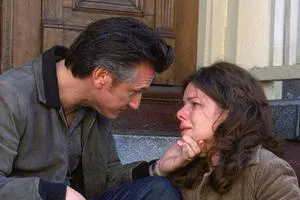
Eastwood seems ill-suited for pure contemplation. It quickly becomes apparent that the old master is wary of mortality and seeks solace in the fact that many meet their end in early youth, especially pretty young girls. Some, even as children of ten, were destined to perish – period. They would then spend their entire lives aware of this, tormented by it. Clint, at 73, clearly finds comfort in this, thinking, “I’m living well.” It’s also possible that “Mystic River,” besides appealing to pensioners, is aimed at teenagers – they aren’t intimidated when “thoughts speak.” Little else is expected from them. But what can the rest of us, in the active phase of life, glean from this film? Sean Penn and Tim Robbins, who likely got involved “out of friendship” with Eastwood? Or Laurence Fishburne, who has gained considerable weight? Or the wild sentimentality of Kevin Bacon, contrasting with Laura Linney’s Mtsensk district? Why subject them and us to this?
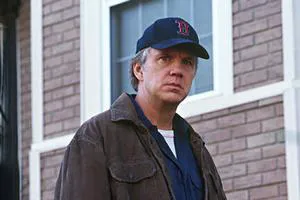
A Tragedy Unfolds
A terrible event befalls three young friends. One of them is abducted and sexually assaulted by adult pedophiles while his friends stand by and watch. The first, now Tim Robbins, is tormented for life, while the others, now Sean Penn and Kevin Bacon, refuse to suffer, and their friendship ends. However, many years later, another tragedy strikes. Sean Penn’s eldest daughter is not assaulted but murdered in a garden. Suspicion quickly and wrongly falls on Tim Robbins. The task remains to uncover who actually killed the girl. In a normal detective story, this would take an hour, resulting in a standard genre film with red herrings and coincidental clues in the style of Agatha Christie. That is, the depictions of everyday life and decaying morals would still lead directly to “who, how, and why.” All the initial elements are present. Kevin Bacon has become a respected FBI agent, while Sean Penn is a small-time shopkeeper with significant criminal connections.
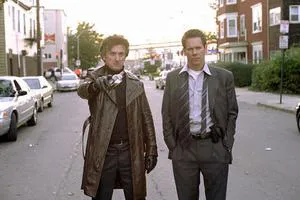
A Divided Narrative
Unfortunately, due to that very “contemplativeness,” “Mystic River” constantly bifurcates. On one hand, Eastwood understands nothing but genre cinema and has embarked on a detective story. On the other hand, his focus is now on morals and everyday life, not “who killed.” Therefore, the drama drags on for two and a half hours, the entire FBI becomes incredibly slow, noticing obvious clues after a week, and conducting interrogations like Gestapo officers in Soviet films from half a century ago. Meanwhile, we watch Sean Penn tear his soul apart in the police cordon around the garden where his daughter’s body lies. He tears for a long time, expressively, as if he’ll write it all off later. We can also observe that the “bad” wife is the one who turns in her “good” husband (Marcia Gay Harden), and, conversely, the “good” wife is the one who won’t turn in her “bad” husband because she herself is a thousand times worse (Laura Linney).
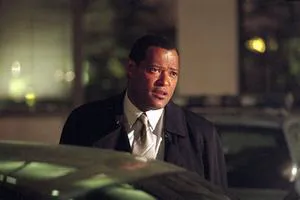
The River’s Metaphor
But the river, whose mystery lies solely in the fact that it’s shown at night, is somewhat thin in the film, as is the metaphor associated with it. The thing is, Eastwood has “figured out” why “let you die today, and I tomorrow.” Because it’s written in your destiny. It’s the fate of the loser to be a loser, just as it’s the fate of the cook to be a cook, and the doctor to be a doctor. And the fate of “elusive Joes” like Sean Penn is to be elusive. Just like in the prehistoric joke from the children’s series: “Who the hell needs him?” But since such Joes kill many people, and it’s quite unpleasant that they are so elusive, the metaphor is needed like air. The air becomes a spit-covered river. One might think that, again, half a century ago, detective films didn’t even retrieve barrels with hidden corpses from rivers, let alone the corpses themselves.
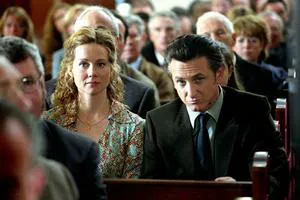
Eastwood leaves us to wonder why “Mystic River” received six nominations and grossed $70 million on a budget of only $30 million. But we don’t intend to. We’ll take a guess and figure out where the catch is. All of America in the film saw, probably, not a fatal drama at all, let alone a detective story. It saw that it itself, despite the Bill Gateses and Empire State Buildings, despite the hamburgers, Hollywoods, world domination, and the pinnacle of civilization, has remained as it was – a country of petty gangsters with a Finnish knife in their boot, a Colt at their hip, and a couple of henchmen-thugs.
A petty gangster with heartbreaking chanson on his lips – that’s the secret of American world domination, deserving of an Oscar.